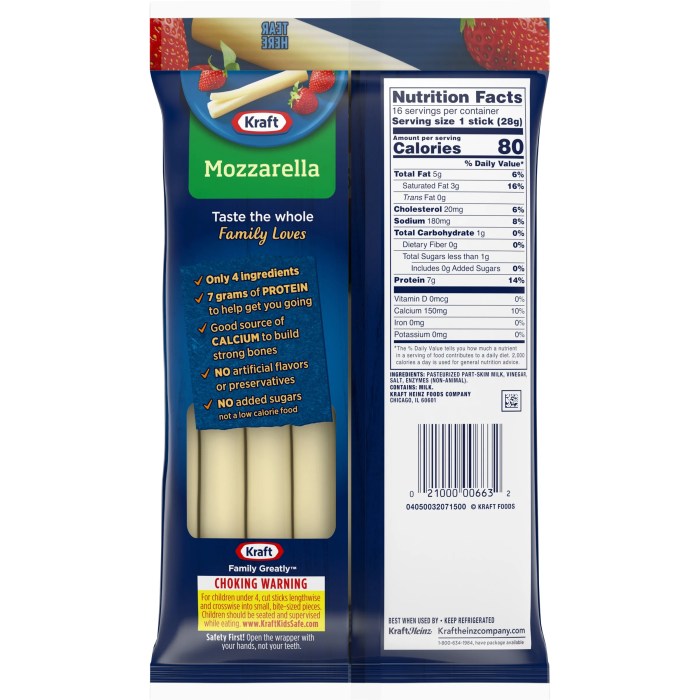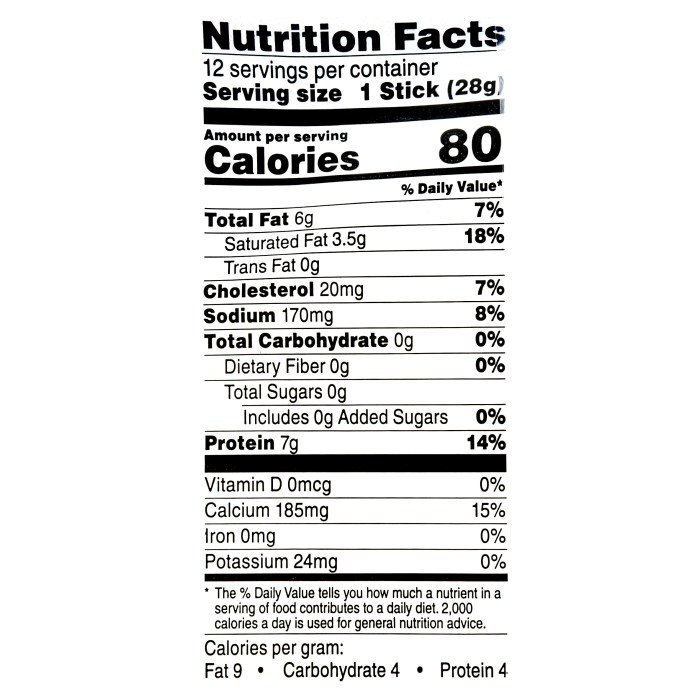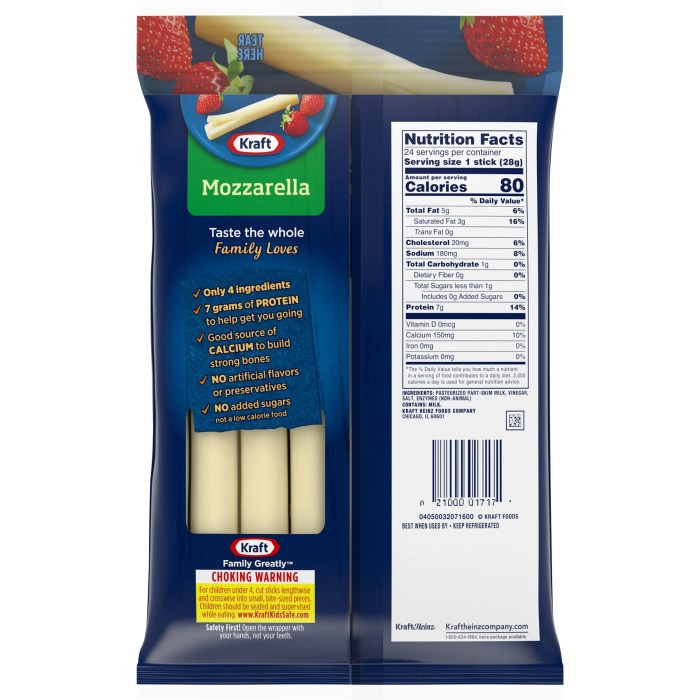Nutritional Composition of Mozzarella String Cheese: Mozzarella String Cheese Nutrition

Mozzarella string cheese nutrition – A pallid moon hangs heavy, casting long shadows on the nutritional landscape of this humble dairy delight. Mozzarella string cheese, a simple pleasure, holds within its yielding form a complex tapestry of nutrients, a silent poem of fats, proteins, and minerals. Let us delve into its composition, a melancholic exploration of its essence.
Macronutrient Breakdown
A single serving, typically around one ounce, offers a delicate balance. The fats, a creamy richness, predominantly saturated, whisper tales of indulgence. The protein, a lean strength, provides the body with building blocks, a quiet promise of sustenance. Carbohydrates, a subtle sweetness, are present in modest amounts, a fleeting echo of energy. The precise ratios vary slightly depending on the brand and manufacturing process, a subtle variation in the composition of this everyday poem.
A typical serving might contain approximately 7 grams of fat (with around 4 grams saturated and 2 grams unsaturated), 7 grams of protein, and 1 gram of carbohydrates. These numbers are merely a fleeting glimpse, an approximation of the truth.
Vitamins and Minerals
Within this simple cheese lies a treasure trove of essential vitamins and minerals, a silent symphony of health. Calcium, the stalwart protector of bones, sings a song of strength. Vitamin A, a guardian of vision, offers its gentle light. Vitamin D, a sunbeam trapped in dairy, whispers promises of immunity. However, the quantities are modest; this is not a panacea, but a gentle contribution to our daily needs.
The exact amounts will fluctuate based on the manufacturing process and the source of the milk.
Cholesterol and Sodium Content
A shadow falls upon this nutritional landscape. Cholesterol, a necessary yet potentially problematic component, resides within the cheese, a reminder of moderation. Sodium, a preservative and flavor enhancer, adds its salty presence, a subtle note of caution. Those watching their cholesterol or sodium intake should consume mozzarella string cheese in moderation, a mindful approach to this delicious yet potentially problematic component of the diet.
The exact amounts of cholesterol and sodium will vary based on the brand and manufacturing processes.
Comparative Nutritional Analysis
| Cheese Type | Fat (g/oz) | Protein (g/oz) | Sodium (mg/oz) |
|---|---|---|---|
| Mozzarella String Cheese | 7 | 7 | 70-100 (variable) |
| Cheddar Cheese | 9 | 7 | 170-200 |
| Provolone Cheese | 8 | 7 | 150-180 |
Note: These values are approximate and can vary depending on the brand and type of cheese. This table presents a fleeting comparison, a melancholic study of similarities and differences. The true nature of these cheeses lies beyond these simple numbers.
Understanding mozzarella string cheese nutrition is key to mindful snacking. For a comparative perspective, consider the nutritional breakdown of processed cheese, like what you’ll find on the velveeta cheese nutrition label , to truly appreciate the simpler, often leaner profile of mozzarella. This comparison highlights the importance of choosing nutrient-rich snacks, guiding you toward a healthier eating journey.
Mozzarella String Cheese and Dietary Considerations

A pallid moon hangs heavy, casting long shadows on the nutritional landscape. Mozzarella string cheese, a seemingly simple pleasure, holds complexities within its creamy embrace. Its suitability for various dietary needs, its impact on our bodies, and the hidden allergens it may contain – all whisper tales of caution and consideration.
Mozzarella String Cheese and Various Diets
The suitability of mozzarella string cheese varies greatly depending on individual dietary restrictions. For those following a low-fat diet, choosing a variety made with skim milk significantly reduces fat content compared to its whole milk counterpart. However, even skim milk versions contain some fat, and portion control remains crucial. Low-sodium diets require careful selection, as many processed cheeses, including some string cheese, are high in sodium.
Reading nutrition labels meticulously is paramount. Ketogenic diets, focusing on high-fat, low-carbohydrate intake, find mozzarella string cheese a welcome addition, offering a satisfying source of fat and protein with minimal carbohydrates. Yet, even in keto, moderation is key.
Impact of Mozzarella String Cheese on Blood Sugar Levels
The effect of mozzarella string cheese on blood sugar is a gentle ripple, not a crashing wave. The lactose content, a type of sugar, can influence blood glucose levels, though generally moderately. Individuals with diabetes or insulin resistance should monitor their blood sugar after consumption and adjust their intake accordingly. The protein and fat content can help to slow the absorption of lactose, mitigating the sharp spikes in blood sugar often seen with purely carbohydrate-rich foods.
This slower release makes it a more manageable option compared to some sugary snacks.
Potential Allergens in Mozzarella String Cheese
A silent threat lurks within the seemingly innocent string: milk protein. Mozzarella string cheese is, undeniably, a dairy product. Individuals with milk allergies or lactose intolerance must approach it with caution, potentially experiencing symptoms ranging from mild discomfort to severe reactions. Furthermore, some processing plants may use shared equipment, leading to potential cross-contamination with other allergens like nuts or soy.
Always check the label for allergen warnings and consider the manufacturing process.
Nutritional Comparison of Mozzarella String Cheese Made with Different Milk Types
A tale of two milks unfolds. Whole milk mozzarella string cheese boasts a richer flavor and higher fat content, offering more calories and a creamier texture. This translates to a more satiating experience but with a higher caloric impact. In contrast, skim milk mozzarella string cheese presents a leaner profile, lower in both fat and calories, yet potentially lacking the same richness of flavor.
The choice between them reflects a personal balancing act between taste and dietary goals – a bittersweet negotiation.
Health Benefits and Potential Drawbacks of Mozzarella String Cheese Consumption

A bittersweet song, this cheese, a comfort and a caution. Its creamy pull, a siren’s call, promises strength and yet whispers of shadows. Let us examine its duality, the light and the dark woven into its very being.A simple pleasure, a quick snack, mozzarella string cheese offers a convenient source of vital nutrients. Yet, like a melody too often repeated, its charms can turn to discord if overindulged.
Bone Health and Muscle Growth Benefits
The calcium in mozzarella string cheese, a building block of strong bones, sings a silent song of support. Each string, a tiny fortification against the weakening march of time. Coupled with its protein content, essential for muscle growth and repair, it offers a subtle strength, a quiet power to the body. Think of the young athlete, fueled by this simple sustenance, building their frame, preparing for the challenges ahead.
The calcium helps to build and maintain bone density, reducing the risk of osteoporosis, a silent thief of strength in later years. The protein contributes to muscle mass, providing the foundation for movement and activity. A small victory, a quiet triumph found in this humble food.
Negative Health Effects of Excessive Consumption
But the song has a darker verse. The saturated fat, a rich, creamy counterpoint, can become a burden if overplayed. Like a melody played too loud, it risks overwhelming the heart, contributing to cholesterol issues and cardiovascular disease. The high sodium content, a salty tear in this otherwise pleasant tune, can contribute to high blood pressure, a silent pressure that weighs heavily on the body.
Consider the individual who consumes excessive amounts daily, their body slowly burdened by the cumulative effect, a slow, mournful decline. The heart, once a strong drum, beats with a heavier rhythm.
Advantages and Disadvantages of Mozzarella String Cheese in a Balanced Diet
The balance, the delicate harmony, is key. Too much of a good thing, like a song played endlessly, loses its charm and becomes tiresome.
- Advantages: Convenient calcium and protein source, portable snack, enjoyable taste.
- Disadvantages: High in saturated fat and sodium, can contribute to weight gain if consumed excessively.
Summary of Health Benefits and Risks, Mozzarella string cheese nutrition
| Benefit | Risk | Benefit | Risk |
|---|---|---|---|
| Provides calcium for bone health | High in saturated fat | Offers protein for muscle growth | High in sodium |
Helpful Answers
Is mozzarella string cheese a good source of protein?
Yes, mozzarella string cheese provides a moderate amount of protein, contributing to muscle growth and repair.
Can I eat mozzarella string cheese on a low-carb diet?
It depends on your specific carb limits. While relatively low in carbs compared to other foods, it’s best to check the nutritional label and adjust your intake accordingly.
Does mozzarella string cheese contain lactose?
Yes, unless it’s specifically labeled as lactose-free, mozzarella string cheese will contain lactose. Individuals with lactose intolerance should exercise caution.
How does the nutritional content vary between different brands of mozzarella string cheese?
Nutritional content can vary slightly between brands due to differences in milk type, processing methods, and added ingredients. Always check the nutrition label for specific details.

